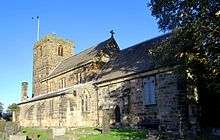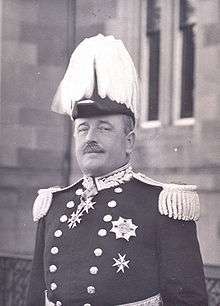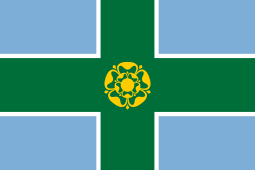West Hallam
| West Hallam | |
 The Village Hall, West Hallam. |
|
 West Hallam |
|
| Population | 4,829 (2001 census[1]) |
|---|---|
| OS grid reference | SK430415 |
| District | Erewash |
| Shire county | Derbyshire |
| Region | East Midlands |
| Country | England |
| Sovereign state | United Kingdom |
| Post town | ILKESTON |
| Postcode district | DE7 |
| Dialling code | 0115 |
| Police | Derbyshire |
| Fire | Derbyshire |
| Ambulance | East Midlands |
| EU Parliament | East Midlands |
| UK Parliament | Mid Derbyshire |
|
|
Coordinates: 52°58′N 1°22′W / 52.97°N 1.36°W
West Hallam is a large village and civil parish close to Ilkeston in the County of Derbyshire in the East Midlands region of England. West Hallam has had its own parish council since 1894 and, since 1974, has been part of the Erewash Borough. The population of the civil parish was 4,829 at the 2001 census reducing to 4,686 at the 2011 census.[2]
Early history

Although it is not known exactly when the village was founded, it existed at the time of the Domesday Book in 1086. St Wilfrid's Church is over 700 years old.[3] In the sixteenth and seventeenth centuries, West Hallam had a reputation for Catholic sympathies at a time when Catholics were persecuted.[3]
Until the early 20th century West Hallam was a small rural village and the property of the Newdigate family. Most jobs were in the agricultural area with mining work locally in the Erewash Valley coalfield. There was also a West Hallam railway station, connected to the Great Northern Railway and Derby Friargate Station.
Twentieth century

The Newdigate family finally parted with their interest as Lords of the Manor in 1914.
The later 20th Century saw rapid change with both the collieries and the railway disappearing during the 1960s. Stanley Colliery (known locally as 'Nibby Pit' on Station Road) was the last to close in 1959 and some buildings remain, now in industrial use. The railway station is now Station House, a private residence.
The colliery spoil tips were removed and landscaped and after much opencast coal extraction the area regained its traditional rural appeal from the 1970s onward. In the 1970s and 1980s a major new housing development dramatically increased the village's population.
The former Second World War Army Ordnance Depot off Cat and Fiddle Lane to the south of the village was reopened in the 1980s as Midland Storage (now known as TDG Pinnacle) and remains a significant local employer.
Most residents are now employed away from West Hallam, some even commuting daily as far as London.[4]
Amenities
One of present-day West Hallam's more notable places is the Bottle Kiln. On the site of the former West Hallam Pottery - which once had two such kilns and was virtually derelict for many years - this well renovated bottle kiln and supporting buildings now houses an art and crafts gallery, a cafe and a Japanese style tea garden and gift shop.[5]
A valuable open space is the recreational area at Straw's Bridge (also known as Swan Lake) on West Hallam's eastern border, on the A609, with Ilkeston. This popular lake and walking area was formed from a flood meadow and the site of the old West Hallam Sewage Works in around 1990. This site was opencast mined in the late 1980s and the restored site along with some adjacent land forming part of the Ilkeston area known as 'Manor' or 'Manners Floods' forms the Straw's Bridge area today.
West Hallam also has very active Cricket and Football Clubs. West Hallam White Rose Cricket Club was founded in 1880 making it one of the oldest clubs in Derbyshire. West Hallam Cricket Club runs three adult teams in the Derbyshire county league and junior sections from U11s to U17s with children welcome from the age of 4 upwards. West Hallam Junior Football Club, has approximately 20 teams ranging from Development to Under 21s. West Hallam did have a first team which was formed in the mid 1880s, but the junior football club came into existence in 1983, West Hallam no longer has a senior team.
Other facilities include a village hall in The Village and a community centre on Station Road. Scargill Church of England School is situated on Beech Lane. There are also currently three pubs (The Punch Bowl, The Newdigate and The White Hart), a shopping centre in The Village and four public recreation grounds.
West Hallam is also well provided as far as local charities are concerned. As well as the Rev John Scargill's charity, established in 1662 and still going strong, needy locals may benefit from the Ann Powtrell Foundation and the West Hallam Trust (West Hallam United Charities), all of which are long established.
Notable residents
- Thomas Rossell Potter (1799–1873), writer, was born here.[6]
- Sir Francis Newdegate GCMG KStJ (1862–1936), final Lord of the Manor until 1914.[7] Was Governor of Tasmania (1917–1920) and of Western Australia (1920–1924).
- Tom Curtis - Former footballer. (Born March 1973).
See also
References
- ↑ "Parish Headcounts: West Hallam CP". Neighbourhood Statistics. Office for National Statistics. Retrieved 2007-04-12.
- ↑ "Civil Parish population 2011". Neighbourhood Statistics. Office for National Statistics. Retrieved 2 April 2016.
- 1 2 "The West Hallam Heritage" by Brenda Parker BA (rev 1987) ISBN 0-86071-287-7
- ↑ History of West Hallam, Parish council site, accessed March 2013
- ↑ History of West Hallam, Parish council site, accessed August 2011
- ↑ Thomas Rossell Potter in Dictionary of National Biography now in the public domain
- ↑ http://www.westhallam-pc.org.uk/page11.html
External links
| Wikimedia Commons has media related to West Hallam. |

 |
Shipley | Mapperley, Heanor | Shipley |  |
| Stanley Common | |
Nottingham, Ilkeston | ||
| ||||
| | ||||
| Derby | Stanley, Dale Abbey | Kirk Hallam |
